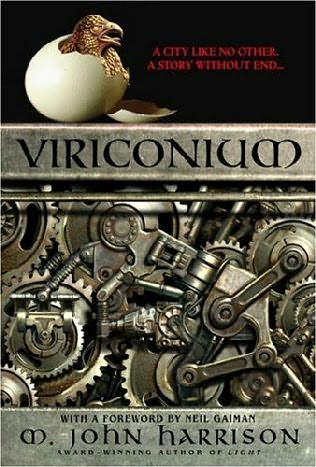 |  |
In between books, again, I've been reading some shorter fictions and finding some great pieces of work. A few weeks ago, while sifting through the newest shelf at the Salem Public Library, I ran across a book and author I had never seen before: M. John Harrison's Viriconium. The book is a collection of three shorter novellas and a series of short stories, all set in and around a fictional city called Viriconium. The first story, The Pastel City, is one of the best stories, short or otherwise, that I have ever read. In it, we meet tegeus-Cromis, one of an aging but capable remnant of the Methven, an elite brotherhood of knights that protects a young queen ruling the city of Viriconium.
Quickly Cromis is caught up in a desperate battle to defend the inexperienced queen against gathering hordes of northern barbarians. Sound a little familiar? It might be, until you realize that Viriconium is the last flowering of humanity, who is in its last fitful throes at the end of history, and when it falls, not even the barbarians will survive. The battles involve impressively ancient and barely-understood technologies mixed with horses, cavalry, and swordplay.
While Cromis rushes with other interesting and colorful characters toward the crisis point, he is beset by a mechanical vulture (we are told one of the arcane creations of the Afternoon cultures, no longer understood and now only feared). The creature warns him not to fear the barbarians, but rather to abandon his quest on behalf of the queen and flee south to Cellur. Fear not the barbarians, it pleads, fear the geteit chemosit. Slowly we learn that this conflict truly is the last of humankind's, and as shadows fall through the climax of the story, the reader learns that the machine-bird's plea is all too true.
This is a wonderful, deeply moving, haunting story. Harrison's prose is equal to the very best I have ever read: lyrical, precise, perfectly shaped for the mood and tone of the epic it relates. The remainder of the stories in the book are terrible. The author, apparently unimpressed by his work on its own terms, proceeds into the realms of metafiction, returning at random in dreamy prose to various other events in the last histories of Viriconium. The best I can winnow out is that he wanted to take the decay and fading glory of the first story and push it into the subconscious, somehow reflecting in the plot dissolution itself the quiet death of human history. Someone truly interested in postmodern, nihilist art for its own sake might bother trudging through the plotless, murky narratives that follow The Pastel City, but not I. Still, the first story alone is worth the price of the book.
While I was at it, I read another story or two from my favorite collection of Robert E. Howard's stories, The Coming of Conan of Cimmeria. Though there are many great stories among those I've read so far, I really enjoyed The Scarlet Citadel. This story begins with King Conan near the end of his life just having lost his crown through treachery at the hands of those who were once his allies. Conan's army is defeated, his crown and capital city seized, and he is hauled off to meet a grisly fate in the dark, monstrosity-infested pits of an infamous sorcerer. This is a great story, Howard at his finest.
And, while I'm at it, let me recommend this same book to any aspiring authors out there, since it contains a rare, wonderful gift. In it, we find the very first of Howard's published stories of the world-famous and iconic Conan, called The Phoenix on the Sword. This in itself is useful to the aspiring writer, because we see the short, tight, and simple story which started one of the most successful characters in all of fantasy literature. But what's more, we also find the first submitted draft, just as Howard wrote it on his typewriter. Compared to the published work, this first piece of fiction is just plain bad. It shows just what can happen when a writer with a great concept meets an obliging editor.
And with NaNoWriMo coming soon, that's no small gift.
2 comments:
You might want to read this:
http://www.fantasticmetropolis.com/show.html?ey,viriconium,1
There are also some very good interviews online - just google "M. John Harrison" - in which Harrison describes what he was trying to accomplish with these stories.
You might find them interesting, especially if you're willing to engage with the tension created by (1) how you felt about the later Viriconium stories and (2) what Harrison was trying to accomplish in writing them.
I’ve been on a Conan kick myself lately, reading some of Howard’s original short stories. I’ve also been reading some of Dark Horse Comics adaptations in a graphic novel; it has awesome art that reminds me of the classic Conan images found on the early books.
Post a Comment